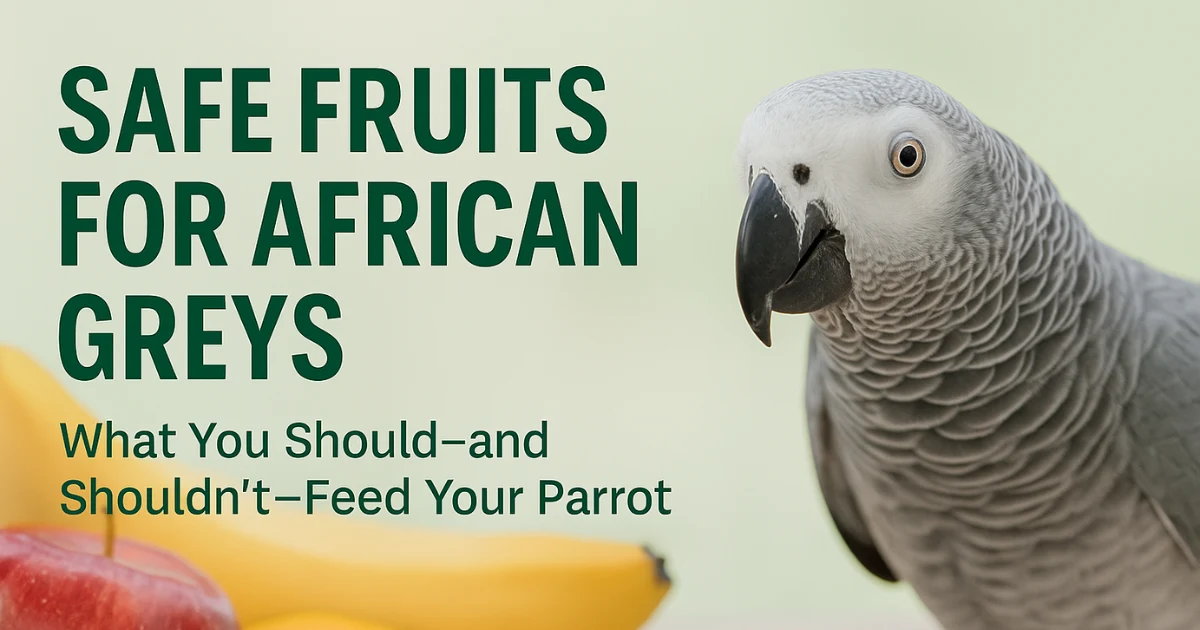
African Greys are incredibly smart parrots—and just like their brains, their diets need to be smart too! If you’re asking yourself what fruits can African Greys eat, you’re already on the right track to being a responsible parrot parent. In this guide, we’ll explore the best fruits for your bird’s health, the ones to avoid, and how to feed them safely. But first, if you’re new to parrot care, start with our guide: Is an African Grey Right for You?
Why Fruits Matter in the African Grey Diet
Fruits play an important supporting role in an African Grey’s diet. While pellets and vegetables should form the base, fruits add hydration, vitamins, minerals, and variety to keep your parrot healthy and mentally engaged.
If you’re still figuring out the full diet structure, our African Grey Diet Basics post breaks down how to balance pellets, veggies, and treats for optimal nutrition.
Safe Fruits for African Greys
Here’s a list of fruits you can confidently offer your African Grey:
Fruit | Benefits | Notes |
Apples | Rich in fiber and antioxidants | Remove seeds — toxic! |
Bananas | Energy boost, potassium-rich | Great occasional treat |
Blueberries | Powerful antioxidants, low in sugar | Wash thoroughly |
Strawberries | High in vitamin C and manganese | Organic preferred |
Pineapple | Aids digestion with bromelain | Slightly acidic — feed sparingly |
Mango | High in vitamin A and folate | Remove pit |
Watermelon | Super hydrating, rich in lycopene | Seedless only |
Grapes | Good antioxidants, tasty & easy to chew | Organic; limit quantity |
Pears | Mild, soft fruit, great for older birds | Remove seeds |
Oranges | Vitamin C boost | Acidic — offer occasionally |
Kiwi | High in fiber and vitamin E | Can be messy — small chunks |
Peaches/Plums | Vitamin A source | Remove pits (they're toxic!) |
Fruits to NEVER Feed Your African Grey
Even some fruits can be dangerous if parts like seeds or pits are left in. But a few should be completely avoided:
Avocado – Contains persin; deadly to birds
Fruit Seeds & Pits – Apple seeds, cherry pits, peach pits, etc. contain cyanide
Rhubarb – Oxalic acid is highly toxic
Unwashed Grapes – Pesticides can be harmful unless organic
When in doubt, leave it out.
How Much Fruit Should They Eat?
Even safe fruits need portion control. Limit fruit to about 10–15% of your African Grey’s daily diet, or 1–2 small servings per day. Too much sugar (even natural sugar) can lead to obesity and liver problems over time.
Pro Tip: Offer fruit in the morning when your parrot is hungriest to prevent waste and encourage healthy eating.
How to Prepare Fruits for Your African Grey
Here’s how I prep fruits for my Grey (and you can too):
Wash all fruits thoroughly (especially store-bought ones)
Cut into small, bird-safe chunks
Remove all seeds and pits
Rotate fruits daily — don’t offer the same one every day
Introduce new fruits slowly to watch for allergies
Want to simplify your prep? I sometimes keep a pre-cut fruit mix in the fridge (covered), ready for daily portions.
Can You Feed Dried or Frozen Fruits?
Yes — but be careful.
Dried fruits should be unsweetened and sulfite-free
Frozen fruits must be thawed completely and contain no added sugar
Pro tip: You can grab parrot-safe dried fruit mixes on Chewy. Just double-check ingredients!
Want a Free Printable?
We’re working on a simple, one-page printable:
“Top 10 Safe Fruits for African Greys” — perfect for your fridge or bird care station.
It’ll be available on our printables page soon. Stay tuned!
Final Thoughts
Offering fruit to your African Grey shouldn’t be stressful. Start simple, go slow, and watch your parrot explore the delicious world of healthy fruit.
Remember — variety is key, and safety comes first.
Got a favorite fruit your Grey loves? Drop it in the comments below or DM me on Instagram @parrotnest!
Frequently Asked Questions(FAQs):
Q1: Can African Greys eat dried fruit?
Yes — but make sure it’s unsweetened and sulfur-free. Avoid store-bought ones with added sugar.
Q2: Can I give them fruit juice?
It’s better to stick with whole fruits. Juices are high in sugar and low in fiber.
Q3: How do I introduce new fruits?
Slowly. Offer one type at a time and watch for reactions (diarrhea, refusal, allergies).
Q4: Which fruits should I absolutely avoid giving my parrot?
Avoid avocado, fruit seeds/pits (like apple seeds), chocolate, and rhubarb — these are toxic to parrots. Also, skip processed or canned fruits with added sugars or preservatives.
Q5: How do I tell if a fruit is upsetting my African Grey’s stomach?
Watch for loose droppings, reduced appetite, or unusual behavior after feeding a new fruit. If symptoms last more than a day, stop feeding the fruit and consult an avian vet.
